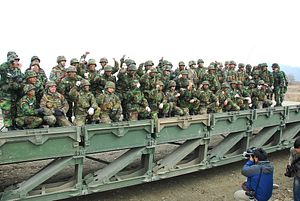The United States and South Korea on Sunday, March 3, announced the inauguration of a new exercise known as Dong Maeng (or “alliance”). The exercise was announced as a modification of the springtime exercises the allies have held in recent years known as Key Resolve and Foal Eagle.
The decision was announced shortly after the conclusion of the second U.S.-North Korea leaders’ summit in Hanoi, Vietnam, which ended without any agreement between the two sides. North Korea has in recent years criticized U.S.-South Korea joint exercises, seeing the mass mobilization component of those drills in the past as a potential ruse for an invasion of its territory.
The Dong Maeng exercise will run from March 4 to March 12 and focus primarily on “strategic, operational, and tactical aspects of general military operations on the Korean Peninsula,” according to a press release from the U.S.-South Korea Combined Forces Command (CFC).
“Exercise Dong Maeng provides us the opportunity to train and rehearse with our Republic of Korea, United States, and United Nations Sending State Partners,“ South Korean Chairman of the Joint Chiefs of Staff General Park Han-ki was quoted as saying in the CFC press release.
General Robert Abrams, the commander of U.S. Forces Korea, noted that it was important for “professional armies to train and maintain to a standard of readiness. These exercises are crucial in sustaining and strengthening the alliance.”
Dong Maeng is unlikely to include any kind of mass allied mobilization of the sort that was normal for U.S.-South Korea springtime exercises through 2017. In 2018, shortly after the start of an inter-Korean diplomatic process at the PyeongChang Winter Olympics, the United States and South Korea jointly modified Foal Eagle and Key Resolve.
Through the ongoing round of diplomacy with North Korea, the United States and South Korea have canceled and modified several allied activities. Last year, following the U.S.-North Korea summit meeting in Singapore, U.S. President Donald J. Trump announced the cancellation of the Freedom Guardian joint command post exercise, slated for August.
The United States and South Korea also canceled two Korea Marine Exchange Program exercises. while South Korea canceled the Ulchi and Taeguk exercises. In December 2018, the two sides also called off the Vigilant Ace aerial exercises.
On Sunday, Trump tweeted that “The reason I do not want military drills with South Korea is to save hundreds of millions of dollars for the U.S. for which we are not reimbursed.” He continued that this was the position he took before becoming the U.S. president.
“Also, reducing tensions with North Korea at this time is a good thing,” Trump added. Trump’s comments on South Korea’s contributions to allied activities come shortly after the two sides agreed to an interim one-year cost-sharing agreement that saw South Korea increase its contributions.
North Korea is not known to have reciprocated U.S. and South Korean exercise modifications and cancellations with any changes to its conventional military drills. The Korean People’s Army — the North Korean armed forces — continue their Winter Training Cycle through the month of March.

































